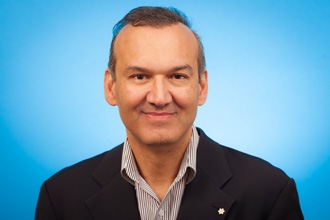Two St. Michael’s researchers named fellows of the Royal Society of Canada

By Francoise Makanda, Dalla Lana School of Public Health


Dr. Patricia O’Campo, interim vice-president of Research, and Dr. Prabhat Jha, director of the Centre for Global Health Research were named fellows of the Royal Society of Canada, joining 2,000 Canadian artists, scientists and scholars in this prestigious group.
“It’s thrilling to be recognized by a group of outstanding scientists who are among the best scientists in Canada. Being recognized for the body of your research, not just one paper or study, just feels great,” said Dr. O’Campo, who is also a professor of Social Epidemiology at the Dalla Lana School of Public Health (DLSPH) at the University of Toronto.
With 30 years under her belt, O’Campo is a pioneer in epidemiology. When she began her training, traditional epidemiology focused on clinical care, epidemics and patient factors that determined major health problems like cancer and cardiovascular health. Her early research helped shape what is now known as social epidemiology.
Her work is considered ground-breaking as few epidemiologists looked outside of the clinical world to the social and economic elements of society as sources for epidemics, and even treated poverty as a nuisance variable. In fact, her first professional studies were met with resistance.
“Epidemiologists misunderstood the goals of my early work, and reviewers questioned the utility of looking beyond individual characteristics as factors that were important in determining poor health,” she said.
“With my first paper, the journal put me through two years of statistical review to go through the data. I was arguing that people’s neighbourhoods affect their overall health,” said O’Campo, noting that it was one of the first papers to examine social determinants of health, specifically the impact of city neighbourhoods on health.
Dr. Jha is a globally recognized epidemiologist conducting ground-breaking work co-sponsored by St. Michael’s Hospital, the University of Toronto and dozens of other collaborating centres. He leads the Centre of Global Health Research and the Million Death Study, a big project enabling middle-to-low-income countries to better quantify the causes of death.
“Out of most of the deaths in the world, approximately 60 million of them, 45 million occur in developing countries, and two-thirds don’t have the cause of death as many occur at home,” said Jha, who is also a professor at DLSPH and holds the Dalla Lana Chair in Global Health and Epidemiology.
As an epidemiologist, Jha maintains that death statistics are crucial in public health as they help identify major trends like declines in child mortality, and the rise in tobacco-attributable deaths.
“Until 2002, India faced a similar gap. We proposed a solution with the Indian government which would take a random sample of homes and follow-up with them every six months to record deaths, and assign causes to those deaths.”
If a death occurred, the team implements a simple two-page form to capture key symptoms and treatment history. Two of 400 physicians who are working online, code the completed form and classify these deaths. According to Jha, it is a simple, cheap and robust way of monitoring causes of death.
“The Million Death Study took ten years to scale up in India and is now used in other countries,” he said.
Jha has established himself as a central figure in global health epidemiology and economics in the last decade. He has worked in advisory roles for various governments, including on President Barack Obama’s global health plan. His publications enabled the first-ever global treaty on health, aimed at reducing smoking.
- Royal Society of Canada’s class of 2018
About St. Michael’s Hospital
St. Michael’s Hospital provides compassionate care to all who enter its doors. The hospital also provides outstanding medical education to future health care professionals in more than 29 academic disciplines. Critical care and trauma, heart disease, neurosurgery, diabetes, cancer care, care of the homeless and global health are among the Hospital’s recognized areas of expertise. Through the Keenan Research Centre and the Li Ka Shing International Healthcare Education Centre, which make up the Li Ka Shing Knowledge Institute, research and education at St. Michael’s Hospital are recognized and make an impact around the world. Founded in 1892, the hospital is fully affiliated with the University of Toronto.
St. Michael’s Hospital with Providence Healthcare and St. Joseph’s Health Centre now operate under one corporate entity as of August 1, 2017. United, the three organizations serve patients, residents and clients across the full spectrum of care, spanning primary care, secondary community care, tertiary and quaternary care services to post-acute through rehabilitation, palliative care and long-term care, while investing in world-class research and education.
About the Dalla Lana School of Public Health
The Dalla Lana School of Public Health is a Faculty of the University of Toronto that originated as one of the Schools of Hygiene begun by the Rockefeller Foundation in 1927. The School went through a dramatic renaissance after the 2003 SARS crisis and it is now the largest public health school in Canada, with more than 900 faculty, 1,000 students, and research and training partnerships with institutions throughout Toronto and the world. With $35.9 million in research funding per year, the School supports discovery in global health, tobacco impacts on health, occupational disease and disability, air pollution, inner city and Indigenous health, among many other areas. For more information, visit the website.
